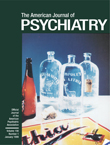Physical Aggression in Dementia Patients and Its Relationship to Depression
Abstract
OBJECTIVE: The goal of this study was to determine the frequency of physically aggressive behavior in community-residing patients with dementia and its relationship to depression. METHOD: A consecutive series of 541 patients with DSM-IV-defined dementia underwent comprehensive neuropsychiatric evaluation and were rated on the Cornell Scale for Depression in Dementia, the Mini-Mental State, the Psychogeriatric Dependency Rating Scale, and the General Medical Health Rating. RESULTS: Physically aggressive behavior was exhibited by 79 patients in the 2 weeks before evaluation. Aggressive behavior was closely associated with moderate to severe depression, male gender, and greater impairment in activities of daily living, even after adjustment for delusions, hallucinations, sleep disturbance, and severity of cognitive impairment. After adjustment for depression, gender, and impairment in activities of daily living, there was no association between physically aggressive behavior and the presence of either delusions or hallucinations. CONCLUSIONS: A substantial minority of patients with dementia exhibit physically aggressive behavior, and this aggression is strongly linked with the presence of depressive symptoms. It is possible that the identification and treatment of depression in dementia may be a means of preventing and managing physically aggressive behavior.



